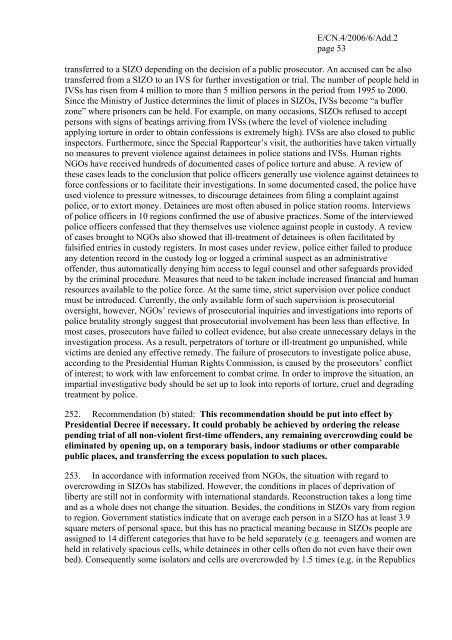E Economic and Social Council - acnudh
E Economic and Social Council - acnudh
E Economic and Social Council - acnudh
You also want an ePaper? Increase the reach of your titles
YUMPU automatically turns print PDFs into web optimized ePapers that Google loves.
E/CN.4/2006/6/Add.2<br />
page 53<br />
transferred to a SIZO depending on the decision of a public prosecutor. An accused can be also<br />
transferred from a SIZO to an IVS for further investigation or trial. The number of people held in<br />
IVSs has risen from 4 million to more than 5 million persons in the period from 1995 to 2000.<br />
Since the Ministry of Justice determines the limit of places in SIZOs, IVSs become “a buffer<br />
zone” where prisoners can be held. For example, on many occasions, SIZOs refused to accept<br />
persons with signs of beatings arriving from IVSs (where the level of violence including<br />
applying torture in order to obtain confessions is extremely high). IVSs are also closed to public<br />
inspectors. Furthermore, since the Special Rapporteur’s visit, the authorities have taken virtually<br />
no measures to prevent violence against detainees in police stations <strong>and</strong> IVSs. Human rights<br />
NGOs have received hundreds of documented cases of police torture <strong>and</strong> abuse. A review of<br />
these cases leads to the conclusion that police officers generally use violence against detainees to<br />
force confessions or to facilitate their investigations. In some documented cased, the police have<br />
used violence to pressure witnesses, to discourage detainees from filing a complaint against<br />
police, or to extort money. Detainees are most often abused in police station rooms. Interviews<br />
of police officers in 10 regions confirmed the use of abusive practices. Some of the interviewed<br />
police officers confessed that they themselves use violence against people in custody. A review<br />
of cases brought to NGOs also showed that ill-treatment of detainees is often facilitated by<br />
falsified entries in custody registers. In most cases under review, police either failed to produce<br />
any detention record in the custody log or logged a criminal suspect as an administrative<br />
offender, thus automatically denying him access to legal counsel <strong>and</strong> other safeguards provided<br />
by the criminal procedure. Measures that need to be taken include increased financial <strong>and</strong> human<br />
resources available to the police force. At the same time, strict supervision over police conduct<br />
must be introduced. Currently, the only available form of such supervision is prosecutorial<br />
oversight, however, NGOs’ reviews of prosecutorial inquiries <strong>and</strong> investigations into reports of<br />
police brutality strongly suggest that prosecutorial involvement has been less than effective. In<br />
most cases, prosecutors have failed to collect evidence, but also create unnecessary delays in the<br />
investigation process. As a result, perpetrators of torture or ill-treatment go unpunished, while<br />
victims are denied any effective remedy. The failure of prosecutors to investigate police abuse,<br />
according to the Presidential Human Rights Commission, is caused by the prosecutors’ conflict<br />
of interest; to work with law enforcement to combat crime. In order to improve the situation, an<br />
impartial investigative body should be set up to look into reports of torture, cruel <strong>and</strong> degrading<br />
treatment by police.<br />
252. Recommendation (b) stated: This recommendation should be put into effect by<br />
Presidential Decree if necessary. It could probably be achieved by ordering the release<br />
pending trial of all non-violent first-time offenders, any remaining overcrowding could be<br />
eliminated by opening up, on a temporary basis, indoor stadiums or other comparable<br />
public places, <strong>and</strong> transferring the excess population to such places.<br />
253. In accordance with information received from NGOs, the situation with regard to<br />
overcrowding in SIZOs has stabilized. However, the conditions in places of deprivation of<br />
liberty are still not in conformity with international st<strong>and</strong>ards. Reconstruction takes a long time<br />
<strong>and</strong> as a whole does not change the situation. Besides, the conditions in SIZOs vary from region<br />
to region. Government statistics indicate that on average each person in a SIZO has at least 3.9<br />
square meters of personal space, but this has no practical meaning because in SIZOs people are<br />
assigned to 14 different categories that have to be held separately (e.g. teenagers <strong>and</strong> women are<br />
held in relatively spacious cells, while detainees in other cells often do not even have their own<br />
bed). Consequently some isolators <strong>and</strong> cells are overcrowded by 1.5 times (e.g. in the Republics
















